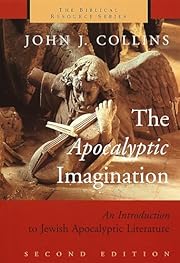

Fai clic su di un'immagine per andare a Google Ricerca Libri.
|
Sto caricando le informazioni... The Apocalyptic Imagination: An Introduction to Jewish Apocalyptic Literaturedi John Joseph Collins
 Sto caricando le informazioni...
Iscriviti per consentire a LibraryThing di scoprire se ti piacerà questo libro. Attualmente non vi sono conversazioni su questo libro.  In The Apocalyptic Imagination: an Introduction to Jewish Apocalyptic Literature John Collins demonstrated an understanding of apocalyptic literature, but only if the reader already possessed a minimum knowledge of the topic that exceeds anything indicated by a title with the word “introduction” in it. Much of his rational analysis was lost to a reader unfamiliar with the many obscure texts which Collins referred to in his survey of apocalyptic writings. Yet he did define an apocalypse quite clearly, provided examples and non-examples, and answered the question of why apocalypses are written. The understanding Collins expected in this book was inconsistent. Eschatology appeared at least once every two to three pages and often appeared multiple times on the same page in some variation. Nowhere in the text was eschatology defined, but it relates to death and the afterlife. Collins used the term Zeitgeist once and defined it as “a common atmosphere of attitudes” during his discussion of the Hellenistic Age’s influence on the development of apocalyptic literature. Millenarianism was defined and discussed in the epilogue. “Millenarianism refers to movements that hope for the overthrow or reversal of the present social order.” Zeitgeist and millenarianism are important in understanding apocalyptic thought and require definition for the reader, yet the reader was left to his own devices to define eschatology. Conversely, Collins’ definition of an apocalypse was quite clear. The criteria of an apocalypse are a narrative framework, revelation to a human by a supernatural being, judgment of the dead and the living, and a new world for the select and the damned. Also highlighted in defining an apocalypse are recurring terms such as righteous, saved, elect for those to be saved, and similar negative terms for those to be damned. Enoch and Daniel were used first to show exemplar apocalypses. Collins then shifted to texts with apocalyptic themes that are and aren’t apocalypses with the Sibylline Oracles and the various Testaments. These books, which had a variety of authors and sections, sometimes met the criteria of an apocalypse and sometimes they did not. Collins discussed as such. The Revelation of John was discussed as a Christian parallel to the apocalypse in 4 Ezra. One is left with an understanding of what makes a text an apocalypse and how ancient texts influenced one another even texts from outside the apocalyptic genre. Although titled an introduction, many of the texts mentioned were quite obscure and unfamiliar for one not previously versed in ancient Jewish literature. The Dead Sea Scrolls are an accessible term, but the titles contained by the scrolls certainly are not. Among the books Collins discussed were the Damascus Document, Dynastic Prophecy, Bahman Yasht, many testaments and oracles, the War Scroll, Genesis Apocryphon, Words of the Heavenly Luminaries, Community Rule, War Rule, and Thanksgiving Hymns. Although these documents’ relevance to or as apocalypses was explained, it is difficult to imagine an introductory level reader following Collins’ many obscure terms and texts. Throughout the book, Collins alluded and stated there is a connection between human nature and apocalypses. 4 Ezra was written by one sympathetic to humanity and understanding of the hardships of his time. The most powerful statement was also in his discussion of 4 Ezra, where Collins simple stated “We believe because we need to believe.” Also on the topic of 4 Ezra is mention that apocalypses offer hope of retribution and a better existence during and after the final judgment. Every apocalypse offers this hope, the difference is how wide or narrow the range of the elect is. Collins points out the contrast in speaking of 4 Ezra and 2 Baruch. Although Collins can overwhelm a reader with little experience in ancient Jewish literature, his command and understanding of the subject is evident. His discussions of hope and retribution for the righteous can be hard to follow, but they are logical and show an understanding of human nature. His understanding was exemplified in the simple statement that we believe because we need to. No matter the label attached to one’s belief, or what that belief is in, humans believe because it is in our natures to. nessuna recensione | aggiungi una recensione
Appartiene alle Collane Editoriali
Apocalyptic literature evokes an imaginative world that is set in deliberate counterpoint to the experiential world of the present. Apocalypticism thrives especially in times of crisis, and it functions by offering a resolution of the relevant crisis, not in practical terms but in terms of imagination and faith. The Apocalyptic Imagination by John Collins is one of the most widely praised studies of Jewish apocalyptic literature ever written. And this second edition of Collins's study represents a complete updating and rewriting of the original work. Especially noteworthy is the chapter on the Dead Sea Scrolls, which now takes into account all of the recently published texts. Other chapters discuss apocalypse as a literary genre, explore the phenomenon and function of apocalypticism in the ancient world, study a wide range of individual apocalyptic texts, and examine the apocalyptic character of early Christianity. Non sono state trovate descrizioni di biblioteche |
Discussioni correntiNessunoCopertine popolari
 Google Books — Sto caricando le informazioni... Google Books — Sto caricando le informazioni...GeneriSistema Decimale Melvil (DDC)229.913Religions Bible Apocrypha Apostolic epistles and canons; ClementinesClassificazione LCVotoMedia: (4) (4)
Sei tu?Diventa un autore di LibraryThing. |
||||||||||||||||||||||||||||||||||||||||||||||||||||||||||||||||||||||||||||||||||||||||||||||||||||||||||||||||||||||||